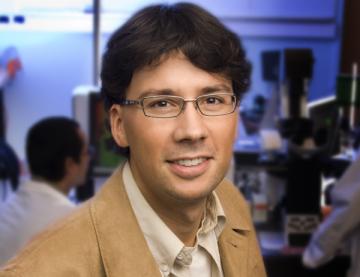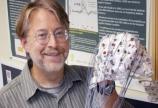UVic adds two new Canada Research Chairs

Two promising scholars in the fields of brain function and micro-engineering are the University of Victoria’s newest Canada Research Chairs.
Also renewed for a second term are three existing UVic Canada Research Chairs—in law, engineering and environmental economics.
The five chairs, funded by a total of $5.2 million, were among 181 chairs across Canada announced on Sept. 23 by Minister of State (Science and Technology) Gary Goodyear.
“The Canada Research Chairs program continues to help us attract and retain some of the brightest researchers in the world,” says Dr. Howard Brunt, UVic’s vice-president research. “The expertise of these talented individuals helps us build on our areas of strength and provides our students with the opportunity to work with researchers at the forefront of their disciplines.”
There are two types of Canada Research Chairs. Tier-1 chairs are “acknowledged by their peers as world leaders in their field” and receive $1.4 million over seven years. Tier-2 chairs are “emerging researchers, acknowledged by their peers as having the potential to lead in their field.” They are awarded $500,000 in research funding over five years.
UVic’s two new tier-2 chairs are Dr. Clay Holroyd (psychology) and Dr. David Sinton (mechanical engineering).
Dr. Clay Holroyd
Holroyd, the Canada Research Chair in Cognitive Neuroscience, is a psychologist who conducts brain research on how people detect and correct their errors and how they learn from the consequences of their actions. His research is advancing the study and treatment of addiction, attention deficit hyperactivity disorder (ADHD), schizophrenia and many other neuro-cognitive disorders.
“I’m especially interested in what goes wrong in the process of decision-making and learning for children with attention-deficit hyperactivity disorder,” says Holroyd. He and his research team are recording the electrical brain activity of ADHD children at play to gain a better understanding of the challenges faced by children with inattention problems.
Dr. Dave Sinton
Sinton, the Canada Research Chair in Integrated Microfluidics and Nanofluidics, describes the focus of his research as “plumbing, but not on the conventional scale.” He studies fluid flow in plumbing the width of a hair—and a thousand times smaller than that at the nanoscale. The research has biomedical and energy applications.
“We need small-scale plumbing to do repeated tests with small amounts of sample to diagnose disease, for instance,” says Sinton, who is currently on study leave at Cornell University in New York. “Such devices have the potential to accelerate research and drug development, improve health-care delivery and distribute advanced medical technologies in developing regions.”
The three chair renewals—all tier-1 chairs—are Dr. Sadik Dost (mechanical engineering), Dr. Cornelis “Case” van Kooten (economics) and Prof. Jeremy Webber (law). Dost, the Canada Research Chair in Semiconductor Crystal Growth, studies the challenges associated with growing reproducible, high-quality bulk semiconducting crystals.
From watches and cell phones to supercomputers and solar panels—almost all electronic devices rely on the semiconducting properties of single crystal materials. The advances Dost has made—typically in collaboration with industrial partners—have applications in a wide variety of fields, including medical imaging, solar energy conversion and security devices.
Van Kooten, the Canada Research Chair in Environmental Studies and Climate Change, is widely recognized as a leader in devising effective economic measures for analyzing various aspects of the environment. His research focuses on the capture and storage of carbon dioxide in the environment, the economic costs of using wind power and the effects of a strong economy on North American forestry production.
Webber, the Canada Research Chair in Law and Society, is a world-renowned scholar in the areas of constitutional theory, cultural diversity, nationalism and Indigenous rights. His research explores the structure of democratic governance and how it relates to the challenges and opportunities of a diverse society.


